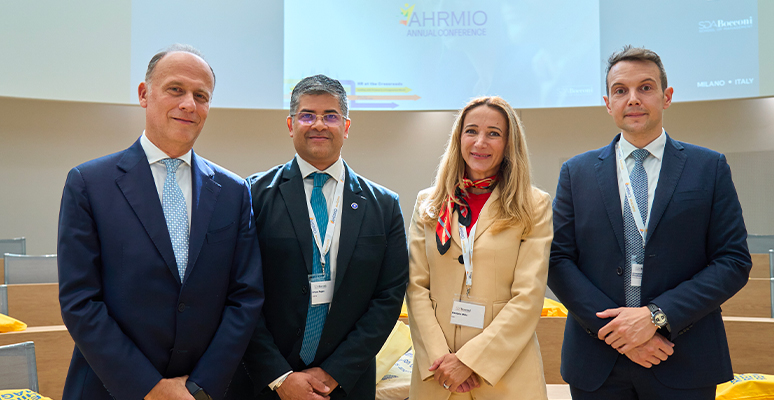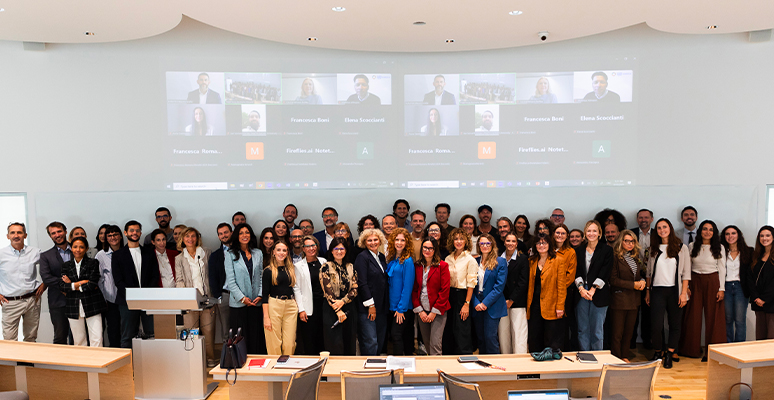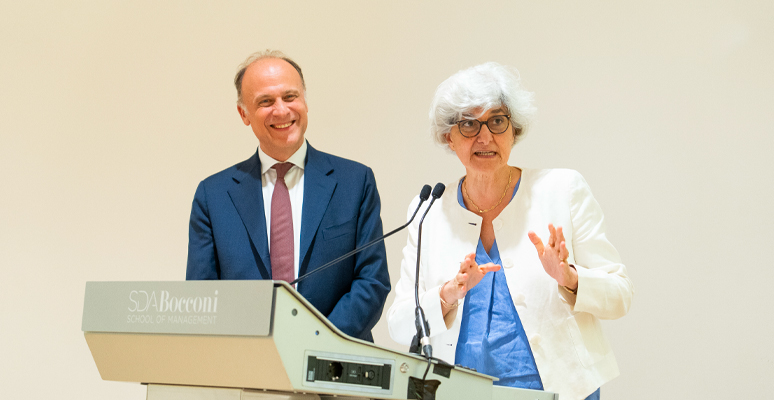
- Start Date
- Duration
- Format
- Language
- 7 Nov 2025
- 1 day
- Class
- English
Stefano Pogutz has been recently appointed Professor of Practice at SDA Bocconi, where he is also the Director of the Full-Time MBA, a program that is on the podium of international rankings. A well-known researcher abroad as well as at home, he has won several teaching awards. His own career shows that sustainability, which is at the heart of his interests, intersects and integrates different levels of activity. We asked him three questions.
Sustainable and circular businesses, social-ecological systems and corporate strategy: how have these issues impacted education programs, including the MBA you direct?
For many years now, scientific data has been telling us that our economic and social development model is no longer in harmony with the planet. It is not just about the climate challenge or the energy challenge, but about closing a wide gap between the way our production and consumption systems work and the possibility for ecological systems to produce the ecosystem services and resources our well-being depends on. Even the United Nations’ 2030 Agenda, with its 17 Sustainable Development Goals, and the European Green Deal cannot avoid acknowledging planetary limits. Becoming aware of this condition and its challenges means rethinking economic and managerial education, from the paradigms and theories we teach, to competencies, specific skills, and the building of consistent leadership models. Over the years, I have always tried to foster an approach where sustainability was part of the responsibilities of managers as well as of business strategies and processes, and was not simply delegated to public decision makers or in the hands of the third sector. On a practical level, this means working on training programs along three lines: trying to put a new paradigm, based on the concept of complex systems, beside the reductionist and productivist paradigm that is still widely prevalent today; introducing the challenges of sustainability through specific courses or seminars that address topics like decarbonization, circular economy, diversity & inclusion, and human rights; integrating these aspects into traditional disciplines such as finance (ESG issues), strategy (stakeholder vision, new competitive opportunities, partnerships), marketing (the analysis of new consumer behaviors), or human resources (diversity, equal opportunities, and inclusion).
In a way, corporate social responsibility has gone through several phases: which one is it currently going through, considering the different perspectives from which we can look at sustainability?
Today, we have entered a new era; several conditions have changed. The regulatory framework has changed rapidly, and an increasing number of norms tend to favor the most sustainable and transparent companies (e.g., access to economic and financial tools aimed at promoting the ecological transition) and hinder those that are less responsible. Finance has had a change of attitude and overcome a skeptical view of sustainability. Today, although ESG ratings still have a long way to go and need to strengthen their methodologies, investors have realized that responsible companies generate greater growth opportunities and have a better risk-to-return ratio. Consumers have also changed their approach: all the behavioral research studies show that Millennials and Generation Z are more sensitive to environmental and social issues, incline toward sustainable and certified purchases, aim for more responsible lifestyles, and are willing to spend more on products and services in line with these expectations. The effects of this evolution impact businesses and the rules with which they compete: on the one hand, sustainability combines with innovation, opening up new opportunities for development and efficiency; on the other, if it is not addressed and integrated consistently, sustainability becomes a cause of progressive exclusion from the market, affecting the risk and profitability of those who invest, both equity and debt. In the new framework, companies led by the most thoughtful leaders are embracing new approaches such as the concept of purpose, brand activism, or net positive. This shows we need to build transformative sustainability that creates value for the community, not just for shareholders at the expense of the environment, workers, and society.
You are particularly committed to the blue economy and have been leading One Ocean Foundation’s scientific committee since 2018: what place does or should this sector occupy in terms of research and policy?
Ocean protection is one of the great challenges of this century. Again, as with climate change and biodiversity loss, science has been telling us for decades that we have a problem, an emergency that must lead to rapid change if we are to preserve the integrity of this ecosystem (or set of ecosystems) that is so important to our well-being. Oceans interact with other systems and are threatened by acidification from greenhouse gas emissions, rising temperatures, fishing, huge amounts of plastic from our consumption, intensive use of chemicals and fertilizers in farming, and micro-dust from tire abrasion. Over 90 percent of the pressure comes from activities that occur on land, not in the sea, every day, every hour. Together with SDA Bocconi’s Sustainability Lab and thanks to One Ocean Foundation and McKinsey & Co., we have been studying the interactions between business and the ocean for about five years. Our aim is to understand the level of attention of the business world to this challenge, and to examine the responses that companies are putting in place in terms of process innovation, product innovation, new business models, and organizational practices. Our research, presented in a number of research reports and a couple of scientific publications submitted to reputable journals, and now under review, shows that most companies and industries do not think of marine protection as a critical issue in which to invest attention and resources. We still find it hard to see the link between ocean pollution and the products and services we produce. This is precisely why the research work we are doing is so important. Through a new and ambitious project, called the Ocean Disclosure Initiative, we want to make all companies (not just the ones in the blue economy) think about the impact of their activities on the sea, demanding transparent reporting and bridging the worlds of business, science and finance.
SDA Bocconi School of Management


Comprendere a fondo e implementare con efficacia la nuova dimensione della sostenibilità aziendale e saper realizzare un piano strategico guidato da criteri ESG.

Il corso intende fornire tutte le competenze necessarie a padroneggiare e applicare i principali strumenti e framework esistenti in materia di sustainability reporting.


